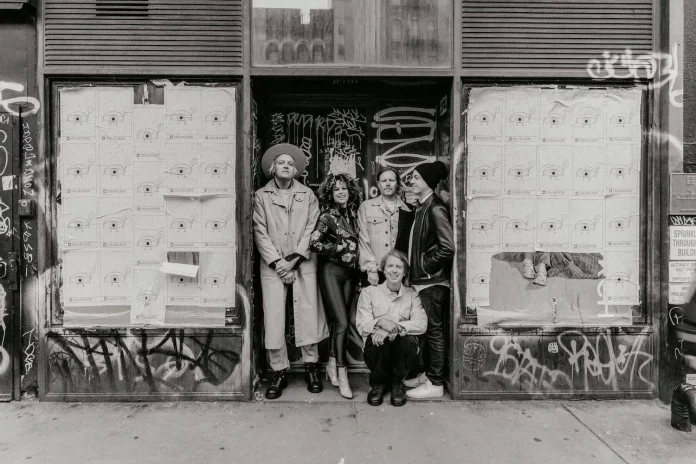Andy Knox
Staff Writer
The distinguishing feature of the alternative rock band Arcade Fire has always been their seeming ability to directly transmit intense, unfiltered emotion straight to their listener. Having received negative reception for their work in the past few years, the band’s new album WE is an opportunity for them to either confirm or dispel the notion that they have permanently fallen off. Regardless of how successful the project will be commercially, the band at least seems to be attempting to appeal to the newer generation, many of whom were just babies when the band first exploded.
“Age of Anxiety I” begins the record with less of a rock sound and more of the recently trendy synthetic retrofuturism of contemporary pop. The track starts with an uncomfortably fast heartbeat which smoothly transitions into bass guitar eighth notes. Lead singer, Win Butler, seeks to capture America’s zeitgeist with lyrics like, “Fight the fever with TV / In the age where nobody sleeps / And the pills do nothing for me / In the age of anxiety.” The lyrics complement the instrumental conformity to modern trends and the anxiety-inducing heavy breathing and passionate vocals make the song feel like this concept in a way that does not make it any less enjoyable.
“Age of Anxiety II: Rabbit Hole” shares all of the same core elements and sees more of backup singer Régine Chassagne’s beautiful vocals. Though the message is important, the delivery is impersonal. No matter how genuine Butler’s voice sounds, the lyrics are so vague and general that his attempt to portray the human effects on the anxiety cripping the modern world feels somewhat uninspired.
Furthermore, while digital music creation permits artists to produce a wider variety of sounds, part of what made Arcade Fire’s earlier work compelling was its dirtier production. Arcade Fire has always emphasized intense emotional expression, and much of their earlier work sounds unpolished in a way that listening to it always made me feel like I was in the same room as them. The passion had always felt amazingly present, and its absence in WE is a sad reminder of the band’s newly unfulfilled potential.
“End of the Empire I-III” is an enigma. The lyrics are difficult to make sense of but, the concept underlying the topics covered in the song — the end of the American empire, spending half of one’s life being sad, climate change, and loss-related substance abuse — seem to focus on uncertainty-based fear at the end of something harmful. Though the lyrics are interesting, the instrumentals are slow and boring. They leave the listener yearning for a resolution that never comes, and it does not make a satisfying listening experience.
“End of the Empire IV” is the obvious place to resolve this tension, but the catharsis never arrives. I still feel like I am waiting for something to end as the next track starts.
Unforgivably, what follows is “Lightning I.” The song’s lyrics transport me to a place in the coastal mountains late at night, lying on top of a car and contemplating the value of technology — which is a pleasant enough feeling in a vacuum, ignoring its context. However, the track itself is a build-up track for “Lightning II,” which nullifies any potential retroactive value of the slow, soft build-up in “End of the Empire I-IV.”
Meanwhile, “Lightning II” is a breath of fresh air, finally providing the energetic release that I had been so confusedly awaiting throughout the three previous songs. Much of the excitement in the song is brought by the fast-paced, fill-heavy drums. This is unsurprising, given the amount of pent-up energy surely present in the drummer and how every other song is either heavily synthetic or soft and slow. The song pumps energy directly into the veins and is hard to listen to without even a smile or a head bob.
The record quickly takes a turn south, however, with the unbearably cheesy “Unconditional I.” The track’s lyrics, none of which are above the level of its opening, “Look out, kid / Trust your heart / You don’t have to play the part they wrote for you / Just be true,” pander so blatantly and lazily that it is a legitimately painful listen.
Though the lyrics of “WE” are not equally bad, they again come off as generic and uninspired. The instrumentals on both tracks are equally boring and slow.
“Unconditional II” is the second and last truly exciting track on the album. It sees the band finally making good use of the high-tech production that has been present, but often boring throughout the album. The lyrics are not the deepest, but Régine Chassagne’s cries of “You’ll be my race and religion,” along with the funky, unpredictable keys and hand-drums are enough to make any reasonable person want to get up and dance.
Overall, WE felt full of potential, but the repeated build-up yielded few rewards. The electric sound, while acceptable, takes away the soul that was once Arcade Fire’s most defining feature.
Rating: 5/10











